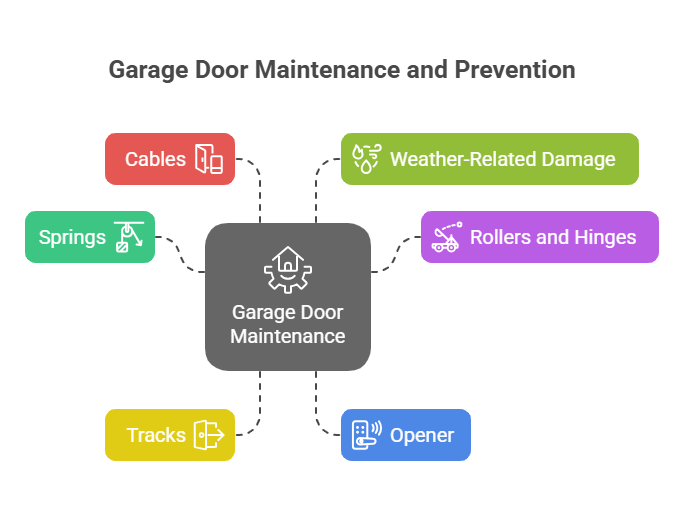Your garage door is one of the most frequently used components of your home — yet it’s often taken for granted until something goes wrong. A malfunctioning garage door can be frustrating and even pose safety risks. Fortunately, understanding common causes of garage door failure can help you take preventive measures and avoid expensive repairs.
Common Reasons Garage Doors Fail (and How to Prevent Them)
1. Broken Springs
The Problem:
Garage door springs are under constant tension and handle the heavy lifting each time you open or close the door. Over time, they wear out and may eventually snap, rendering the door inoperable.
Prevention Tip:
Schedule regular maintenance and consider replacing the springs every 7–10 years, or as advised by a professional. Watch for signs like visible gaps in the coils or loud, unusual noises.
2. Worn-Out Rollers and Hinges
The Problem:
Rollers and hinges help the door glide smoothly along its tracks. When they become worn, rusted, or damaged, the door may get stuck, move unevenly, or produce squeaking noises.
Prevention Tip:
Lubricate the rollers and hinges every few months using a high-quality silicone-based lubricant. Replace any worn or broken parts promptly to avoid further damage.
3. Misaligned or Damaged Tracks
The Problem:
The tracks guide your garage door’s movement. If they become bent, blocked, or misaligned, the door may not open or close properly—and in severe cases, it could derail entirely.
Prevention Tip:
Inspect the tracks regularly to make sure they’re clean and debris-free. Look for signs of dents or misalignment and contact a professional to realign or repair them as needed.
4. Faulty Garage Door Opener
The Problem:
The garage door opener handles the automatic operation. If its sensors are misaligned, the motor is faulty, or internal parts are worn, the opener might stop working.
Prevention Tip:
Check the opener’s sensors and batteries regularly. Clean the lenses and make sure nothing is obstructing the sensor path. If the motor sounds strained or makes odd noises, consider a service check or replacement.
5. Frayed or Broken Cables
The Problem:
Cables work alongside the springs to raise and lower the door. Frayed or snapped cables can cause the door to become unbalanced or inoperable.
Prevention Tip:
Inspect the cables for visible wear, rust, or fraying. If you notice damage, don’t attempt to fix it yourself—contact a trained technician for safe replacement.
6. Weather-Related Wear and Tear
The Problem:
Extreme temperatures, moisture, and seasonal debris can degrade your garage door over time. Wooden doors may warp, while metal doors are prone to rust.
Prevention Tip:
Apply weather seals to shield the door from moisture and fluctuating temperatures. Regularly clean and paint metal doors to prevent corrosion and extend their lifespan.
Final Thoughts
Garage door failures often stem from natural wear and tear—but with consistent maintenance, many issues can be prevented before they become costly repairs. Routine inspections and timely interventions can keep your garage door operating safely and smoothly for years.
If you’re dealing with garage door issues, don’t delay. For expert garage door repair in Rockville, MD or Silver Spring, MD, contact BWI Garage Doors today at +1 888 388 1847. Our skilled technicians are here to help you avoid expensive breakdowns and keep your garage door in top shape.
Link Densustotositus togel

















